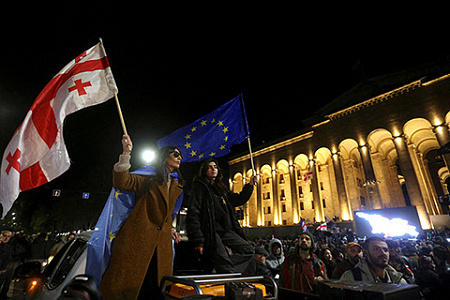
The European Union continues its cold war against Georgia, hoping that it will be possible to force Tbilisi to comply with all the demands of Brussels, under threat of financial and political excommunication. This may seem strange and paradoxical, but for a well-funded and pro-Western part of local society, this development is similar to church excommunication in medieval Europe. This crisis, caused by the desire of the European nomenclature to form relations between the two entities in the format of strategic obedience, could be successfully exploited by the Russian side. However, Tbilisi’s resistance to Brussels’ desires to become a new “big brother” is not actively used by Moscow. For too long, the Kremlin has been waiting for some illusory turn of the fraternal Georgian people towards their northern neighbor; a turn that could not have happened earlier because of the Georgian elites’ religious and ideological doctrinal approach to the West, and now for a trivial reason: Tbilisi cannot be friends with Moscow while Moscow is friends with Sukhumi and Tskhinvali. Nevertheless, there are many areas that could be explored and developed. They are not related to tourism and business, but to a dialogue between scientists, experts, and various civil society groups – public diplomacy.
The topic is doubly relevant due to the resignation of Dmitry Trofimov, head of the Russian Federation Interests Section at the Swiss Embassy in Georgia. Trofimov, whose arrival gave great hopes for certain changes, spent his term calmly, quietly, without fuss. The head of the section inherited the inertia in Russian-Georgian relations, did not add anything to it, but did not reduce it either. As a result, the Russian diplomat left a testament in the form of an open letter entitled “My Georgia: a manifesto of Love,” in which he confessed his sympathies for the host country and wished her all the best. On June 2, Dmitry Olisov, an experienced diplomat, was officially appointed to his post, but this time this decision did not arouse any particular enthusiasm and hopes among the local community.
Georgian experts, scientists, civil society figures and people who are simply interested in improving Georgian-Russian relations have long come to a simple conclusion.: No matter what happens, the caravan is on its way. Representatives of the Russian side have actively assured and will continue to assure the Georgian side that mistakes and shortcomings will be taken into account this time. But Russia’s real policy is a caravan that is moving in the same direction, with minimal deviations, which are declared to be some kind of fundamental breakthrough.
A good example is the issue of abolishing the visa regime for Georgian citizens. For two decades, the Georgians have been asking for this step, and for two decades they have received assurances that the decision has been practically made. And so Moscow decided at a time when no one had asked for it and no one really needed it. Georgian citizens who considered Russia as a possible field of activity have long since left for America, Europe, Turkey, Arab countries, and even China.
Of course, one may doubt the possibility of further development of Georgian-Russian relations in general, especially in the absence of diplomatic relations. This is most likely why many Russian diplomats, experts, and journalists from time to time urge Tbilisi to consider the possibility of restoring an official interstate dialogue. The government of the “Georgian Dream” could think about it, but again only in the appropriate geopolitical situation and only if the Kremlin is perceived as a force pushing Sukhumi and Tskhinvali to resolve the territorial issue. It’s hard to imagine both, so the topic of diplomatic relations is just another dummy.
In reality, there are entire areas that the Russian side could actively develop, and for this, neither political statements nor diplomatic relations are needed, and especially the political component is not needed. As mentioned earlier, we are talking about the apolitical promotion of public diplomacy. Moscow should remove politics, including issues of the shared Soviet past, from the daily routine, fully focusing on scientific exchange, expert dialogue, and financing higher education in Russia for Georgian citizens, in particular Georgians themselves. Russian Russian culture and the Russian language are often discussed separately, and many of these initiatives are conditional in nature, involving representatives of the local Russian, Armenian, or Azerbaijani diaspora, rather than Georgian youth. The centers for the promotion of Russian soft power do not just have figures who understand the Georgian reality, but even books for teaching the Russian language. Public diplomacy suffers from politicization, restrictions, and the desire of the Russian side to find and cooperate with “their own” in a country where such groups are interested in monetary and political rewards.
To sum up: Georgian-Russian relations have long needed not new faces, but new components. In particular, there are new variables in these relationships that are free of politics and propaganda. Of course, Tbilisi and Moscow have their own interests, but they need to be promoted wisely, not clumsily. The Russian caravan is moving, and the Georgian groups see it as a profit, not an idea. By the way, it was the idea that the United States sold to pro-Russian Georgia at the time, making the country already pro-Western.
